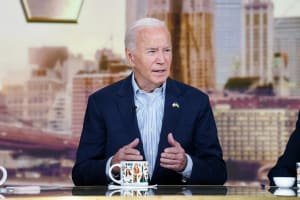Lebanese Red Cross workers inspect a destroyed three-story building, after it collapsed following an Israeli air raid in the southern Lebanese border village of Shebaa, Sept. 27, 2024. (Photo: Stringer/DPA via Reuters)
“Israel shares the aims” of the U.S. truce initiative, said Israeli Prime Minister Benjamin Netanyahu in a statement intended to clarify his stance regarding a ceasefire between Israel and Hezbollah.
Meanwhile, Israel continued to strike Hezbollah targets across Lebanon, hitting 220 sites on Thursday alone.
“Due to a lot of misreporting around the U.S.-led ceasefire initiative, it is important to clarify a few points,” began the statement published by Netanyahu’s office (PMO) on Friday.
“Our teams met (Thursday, Sept. 26) to discuss the U.S. initiative and how we can advance the shared goal of returning people safely to their homes. We will continue those discussions in the coming days.”
The U.S. and several other countries had presented a joint statement on Wednesday night calling for a 21-day ceasefire, while Netanyahu was en route to New York.
Upon landing, the prime minister stated, “We are continuing to strike Hezbollah with full force. And we will not stop until we achieve all our goals.”
Amid withering criticism from Israeli politicians opposed to a truce, Israeli Foreign Minister Israel Katz reiterated on Thursday that there would be no ceasefire until the safe return of Israel’s northern residents.
Additionally, the PMO released another statement, claiming: “The report about a ceasefire is incorrect. This is an American-French proposal that the Prime Minister has not even responded to. The report about the purported directive to ease up on the fighting in the north is the opposite of the truth.”
The statement caused considerable tensions with the U.S., as Biden administration officials had told media outlets a ceasefire was expected within hours and that Netanyahu had committed to the U.S. initiative.
White House Spokesman John Kirby told reporters that the proposal would not have been made unless the United States was convinced that Israel had agreed to it.
“I don’t know why Netanyahu said what he said and I don’t know what his considerations were – whether they were political or operational. Ask him why he said that,” Kirby said.
In his statement on Friday, Netanyahu attempted to control the damage, stating, “Earlier this week, the United States shared with Israel its intention to put forward, together with other international and regional partners, a ceasefire proposal in Lebanon.”
After noting that Israel shared the aims of the ceasefire – but apparently, not its content – he added, “Israel appreciates the U.S. efforts in this regard because the U.S. role is indispensable in advancing stability and security in the region.”
While the political tensions threatened to overshadow Netanyahu’s UN General Assembly (UNGA) speech, scheduled for Friday, the IDF continued pounding Hezbollah targets in Lebanon.
After conducting several waves of airstrikes on Thursday, including a strike in Beirut that killed Hezbollah’s aerial array commander, the IDF said it had destroyed around 220 targets in southern Lebanon, as well as “deep” within its territory, referring to the areas of the Bekaa Valley and the Lebanese border with Syria.
The Israeli army also announced the elimination of Hezbollah’s rocket and missile chief, Ibrahim Muhammad Qubaisi, on Tuesday, as well as several other commanders in an Israeli airstrike. Qubaisi’s deputy, another senior commander of the missile force and a senior operative in Hezbollah’s surface-to-surface missile system were eliminated in another IDF strike.
“These terrorists formed centers of knowledge in the Hezbollah terrorist organization and over the years led terror attacks and power building processes to damage the Israeli home front,” the IDF stated.
Later on Friday, the IDF announced it had struck the launcher used to attack Haifa and its suburbs, as part of another wave of airstrikes across Lebanon.
In addition, Israel attacked a Syrian army base in the Lebanon-Syria border area near Damascus overnight. Five soldiers were reportedly killed.
The IDF didn’t immediately comment on the report.

































